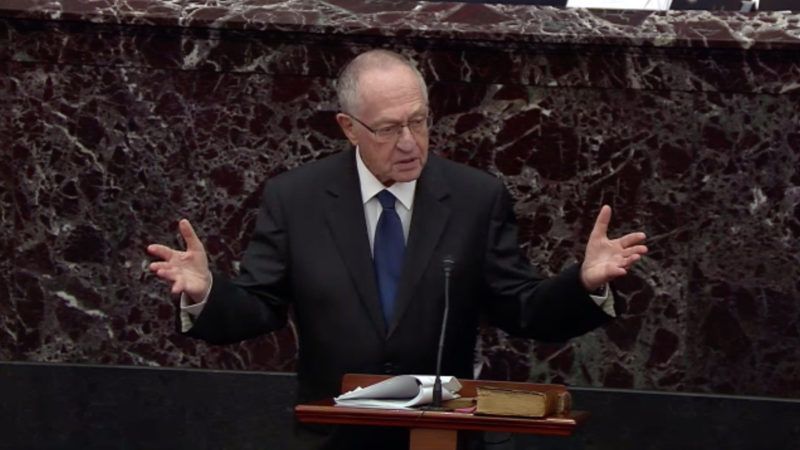Alan Dershowitz: John Bolton Allegations Are Not Impeachable, Nor Is Abuse of Power
"Purely non-criminal conduct, including 'abuse of power' and 'obstruction of justice,' are outside the range of impeachable offenses," Dershowitz said.

Alan Dershowitz, the lawyer and retired Harvard law professor who is on President Donald Trump's impeachment defense team, argued during the Senate trial on Monday evening that recent allegations made in a book by former national security adviser John Bolton are not impeachable.
"Nothing in the Bolton revelations, even if true, would rise to the level of an abuse of power or an impeachable offense," said Dershowitz.
In a book that is soon to be released, Bolton says that Trump held up $391 million in congressional authorized security assistance from Ukraine so he could pressure President Volodymyr Zelenskiy into announcing investigations that zeroed in on Trump's political rivals, namely former Vice President Joe Biden. In December, Trump was impeached by the House on abuse of power and obstruction of Congress in connection with the incident.
The Bolton allegations threw a wrench into the Senate trial as Republicans mull if they want to introduce witnesses and additional evidence after arguments conclude. Lawmakers will need a simple majority to hear new testimony, and Sens. Mitt Romney (R–Utah) and Susan Collins (R–Maine) have expressed that they will likely vote in favor. Senate Majority Leader Mitch McConnell (R–Ky.) has emphasized the need for speedy proceedings and expressed his desire that no witnesses be called.
In his hourlong argument, Dershowitz also asserted that neither abuse of power nor obstruction of Congress rise to the threshold of impeachable conduct. The only time a president should be removed from office, he said, is if they commit an offense that violates a criminal statute or is "akin" to a crime. (It's worth noting that the latter caveat is a modified position for the lawyer, who in his 2018 book, The Case Against Impeaching Trump, said flatly that impeachment requires a crime.)
"Purely non-criminal conduct, including 'abuse of power' and 'obstruction of justice,' are outside the range of impeachable offenses," Dershowitz said.
That position is an about-face from the stance he took during the Clinton impeachment, when he said that there "certainly doesn't have to be a crime" to impeach a president. "If you have somebody who completely corrupts the office of president, and who abuses trust, and who poses great danger to our liberty, you don't need a technical crime," he told CNN in 1998.
The view he expressed over two decades ago is the one in line with legal consensus, and Dershowitz himself admits that he is in the minority.
Jonathan Turley, the Republicans' witness during the House Judiciary Committee hearing in December, wrote before he testified that impeachable offenses "were meant to reach a similar level of gravity and seriousness (even if they are not technically criminal acts)." That sounds similar to Dershowitz's newest position on the subject, though Turley also noted that "the use of military aid for a quid pro quo to investigate one's political opponent, if proven, can be an impeachable offense." If we take that counsel, contrary to Dershowitz, then Bolton's allegations merit consideration.
